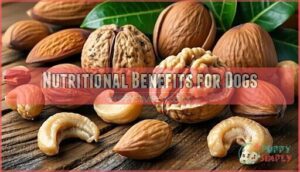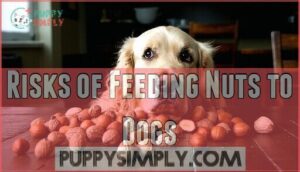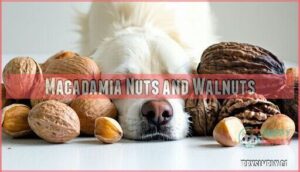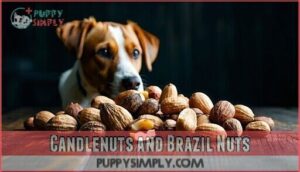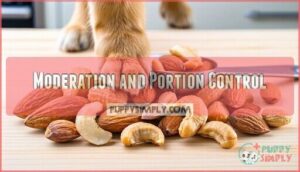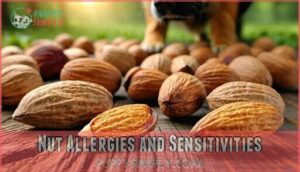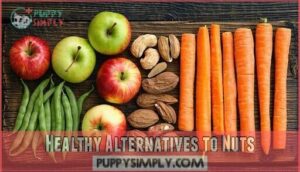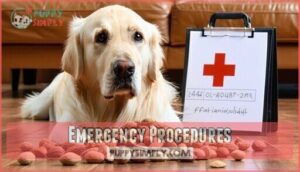This site is supported by our readers. We may earn a commission, at no cost to you, if you purchase through links.
 You can safely give your dog peanuts, cashews, and pecans in small amounts, but avoid macadamia nuts, walnuts, and Brazil nuts entirely.
You can safely give your dog peanuts, cashews, and pecans in small amounts, but avoid macadamia nuts, walnuts, and Brazil nuts entirely.
When considering what nuts can dogs eat, stick to plain, unsalted varieties without shells or seasonings. Peanut butter is fine if it doesn’t contain xylitol, which is toxic to dogs.
Always remove shells to prevent choking, and limit portions since nuts are high in fat and calories. Watch for signs of upset stomach or allergic reactions after introducing any new nut.
While these safe nuts can provide protein and healthy fats, moderation is key to preventing digestive issues and weight gain.
Table Of Contents
Key Takeaways
- You can safely give your dog plain, unsalted peanuts, cashews, and pecans in small amounts, but always remove shells and avoid any seasonings or additives.
- Never feed your dog macadamia nuts, walnuts, or Brazil nuts as they’re toxic and can cause serious symptoms like weakness, tremors, vomiting, and neurological problems.
- Keep portions tiny since nuts are high in fat and calories – they should make up less than 10% of your dog’s daily calories to prevent weight gain and digestive issues.
- Watch for signs of choking, allergic reactions, or upset stomach after giving nuts, and contact your vet immediately if you notice vomiting, difficulty breathing, or unusual behavior.
Nuts Safe for Dogs
You can safely give your dog certain nuts in small amounts as occasional treats.
Plain, unsalted peanuts, cashews, and pecans are generally safe options when fed in moderation and without shells or additives.
Peanuts and Peanut Butter
Peanuts top the list as the safest nuts for dogs since they’re technically legumes.
Peanuts lead the pack as your pup’s safest nut choice—they’re actually legumes in disguise!
Plain, unsalted peanuts make excellent dog treats when given sparingly. However, peanut butter requires caution—many commercial brands contain xylitol, which is deadly toxic.
Always check labels or choose xylitol-free safe brands. Many owners also buy special dog peanut butter for their pets.
Homemade recipes guarantee better peanut digestion and proper dog nutrition without harmful additives.
Cashews and Cashew Butter
Your dog’s cashew cravings can be safely satisfied with proper cashew preparation.
Plain, unsalted cashews offer nutritional value through protein and healthy fats.
However, cashew serving sizes must remain tiny—just 1-3 nuts daily.
Skip cashew butter recipes containing additives.
Raw cashew nuts dogs should never consume.
Excessive consumption, however, may lead to gastrointestinal distress.
Consider cashew alternatives like peanut butter dogs enjoy, making cashews occasional dog treat nuts rather than regular nuts for dogs, emphasizing the importance of healthy fats.
Pecans and Pecan Butter
Despite being technically safe, pecans carry significant risks for your furry friend.
These nuts contain juglone and frequently harbor dangerous molds that produce toxic mycotoxins.
Pecan toxicity can trigger gastrointestinal upset and neurological symptoms.
If you’re considering pecan butter, stick to tiny amounts—1-2 nuts maximum.
Better safe than sorry with these potentially problematic treats.
What Nuts Can Dogs Eat
When choosing safe nuts for dogs, you’ll want to stick to a carefully curated list that won’t put your furry friend at risk. The key lies in understanding which varieties offer benefits without the dangerous side effects that come with toxic options.
Your safest bets include unsalted peanuts, plain cashews, and cooked chestnuts. These nuts can dogs eat without major concerns when prepared properly and given in moderation.
However, nut preparation matters substantially – always remove shells, avoid salted varieties, and skip any flavored options.
Consider these essential factors when selecting nuts:
- Breed sensitivity varies, with smaller dogs facing higher choking risks
- Age considerations affect nut digestibility in puppies and senior dogs
- Nut sourcing from reputable suppliers reduces contamination risks
Remember that nuts good for dogs must be plain and properly prepared to maximize safety.
Nutritional Benefits for Dogs
When you feed your dog safe nuts in moderation, you’re providing valuable protein, healthy fats, and essential vitamins that support coat health and circulation.
These nutrients can complement your dog’s regular diet, though nuts aren’t necessary since balanced dog food already contains everything your pet needs, including support for circulation.
Protein and Vitamin Content
Safe nuts provide valuable protein sources that support your dog’s muscle development and cellular repair.
These nutrient-dense treats contain essential vitamins like B-complex and E, plus minerals including potassium and iron.
Proper nutrient absorption from healthy nuts dogs can enjoy helps maintain dietary balance.
When choosing nuts good for dogs, you’ll boost their mineral intake while supporting overall dog nutrition nuts can provide.
However, be cautious because macadamia nuts are toxic to dogs and should be avoided.
Healthy Fats and Fiber
Healthy nuts dogs consume deliver monounsaturated fats that boost fat metabolism and provide concentrated energy sources.
These beneficial lipids support cellular functions while fiber types found in safe nuts promote digestive benefits through improved gut health.
The combination creates ideal dog nutrition nuts can offer – enhanced energy levels and better digestive processing without excessive calories, supported by concentrated energy sources and better digestive processing.
Coat Health and Circulation
The omega fatty acids in safe nuts like cashews boost your dog’s circulation and nutrient absorption through improved blood flow.
These monounsaturated fats enhance skin hydration, creating that glossy coat you love seeing.
While almonds for dogs and walnuts for dogs aren’t recommended, proper supplement options can address breed predisposition to dull coats, supporting ideal dog coat condition naturally with the help of monounsaturated fats.
Risks of Feeding Nuts to Dogs
While nuts can offer nutritional benefits for dogs, they also carry significant health risks that you can’t ignore.
Your dog faces potential choking hazards, toxic reactions, and digestive issues that can lead to serious complications requiring immediate veterinary attention.
Choking Hazards and Obstructions
Nut size matters in regards to swallowing risks for your dog.
Whole almonds and pistachios can lodge in your pet’s throat, while shell fragments create serious intestinal blockage concerns.
Even "safe" nuts become choking hazards when dogs gulp them down too quickly.
Watch for gagging, drooling, or difficulty breathing – these symptoms require immediate veterinary intervention to prevent life-threatening obstructions.
Toxicity and Allergic Reactions
Even familiar nuts to avoid dogs can trigger serious reactions.
Toxic nuts dogs consume may cause immediate symptoms or develop allergic responses over time.
Nut allergies dogs experience vary widely, from mild stomach upset to life-threatening reactions.
Watch for these nut toxicity dogs warning signs:
- Vomiting, diarrhea, or excessive drooling
- Weakness in hind legs or trembling
- Difficulty breathing or skin irritation
- Lethargy or loss of appetite
The key symptoms to observe are related to immediate symptoms and the overall health of the dog.
Pancreatitis and Obesity
High-fat nuts pack on pounds faster than you’d think.
Their calorie density makes portion control essential for weight management.
A single serving can trigger canine pancreatitis, especially in dogs already prone to this painful condition.
The fat content in nuts contributes directly to obesity and weight gain.
Consider dietary alternatives like carrot sticks or apple slices instead of maintaining a high-fat diet, focusing on a healthier option for weight management.
Toxic Nuts for Dogs
Several nuts pose serious health risks to dogs and should never be given as treats.
These toxic varieties can cause symptoms ranging from digestive upset to severe neurological problems, making it essential to know which nuts to avoid completely, as they can lead to severe health issues.
Macadamia Nuts and Walnuts
Regarding toxic nuts, macadamia nuts top the danger list for dogs.
Macadamia toxicity causes weakness, vomiting, and tremors within hours.
Walnuts present serious mold risks and juglone poisoning concerns.
Black walnuts especially harbor dangerous mycotoxins that trigger seizure symptoms.
These unsafe nuts for dogs require immediate veterinary attention if consumed.
Hazelnuts and Kola Nuts
Steer clear of hazelnuts and kola nuts – they’re seriously bad news for your furry friend.
Hazelnut dangers include choking risks and digestive upset, while kola toxicity stems from dangerous caffeine levels that can harm your dog’s heart.
These toxic nuts pose immediate threats requiring immediate action, so it’s best to skip these unsafe nuts for dogs entirely and choose safe alternatives like carrots or apple slices instead, to ensure your pet’s safety and well-being with safe alternatives.
Candlenuts and Brazil Nuts
Candlenuts pack dangerous toxicity levels that’ll make your pup seriously sick.
Brazil nuts contain sky-high selenium – just one nut can poison smaller dogs. Both nuts cause choking hazards and digestive blockages.
Skip these risky options entirely. Stick to safe nuts like plain peanuts or cashews in tiny amounts.
Your dog’s health isn’t worth the gamble. Dogs can eat peanuts, also known as groundnuts, but they should be given in limited quantities.
Safe Feeding Guidelines
When you offer nuts to your dog, you’ll need to follow specific guidelines to keep them safe and healthy.
Proper portion control, shell removal, and careful monitoring can prevent choking hazards and digestive problems that commonly occur with nut consumption.
This approach ensures that your dog can enjoy nuts while minimizing the risks associated with digestive problems.
Moderation and Portion Control
Even safe nuts pack serious calorie density that can derail your dog’s weight management goals.
Follow the 10% treat percentage rule – dog treats shouldn’t exceed 10% of daily calories.
A single cashew contains roughly 9 calories, so serving sizes matter tremendously.
Monitor safe amounts carefully to prevent weight gain and dog obesity through proper dog treat portioning practices.
Removing Shells and Additives
Shell removal isn’t just good practice—it’s non-negotiable for your dog’s safety.
Nut shells create serious choking hazards and intestinal blockages that require emergency surgery. Always check labels for xylitol risks in commercial nut butters, as this sweetener proves deadly to dogs.
- Remove all shells completely before offering any nuts to your pet
- Choose unsalted, unseasoned varieties or make homemade butters without additives
- Verify safe brands don’t contain xylitol, chocolate, or artificial sweeteners
Monitoring for Adverse Reactions
After introducing nuts to your dog’s diet, watch closely for digestive upset like vomiting or diarrhea within 24 hours.
Monitor for allergic signs including itching, swelling, or difficulty breathing. Notice behavioral changes such as lethargy or restlessness.
Keep a vomiting watch and check for unusual stool changes. If symptoms persist, consider dog allergy testing and consult your veterinarian immediately.
Nut Allergies and Sensitivities
Just like humans, dogs can develop allergic reactions to nuts, with symptoms ranging from mild itching to severe digestive upset.
You’ll need to watch for warning signs and know how to respond if your dog shows sensitivity to any nut variety.
Symptoms and Warning Signs
Nut allergies manifest through several telltale signs you shouldn’t ignore.
Watch for persistent itching, skin rashes, or digestive upset like vomiting and diarrhea. Neurological signs include lethargy and weakness, while severe allergic reactions may cause breathing difficulties.
Dog poisoning from toxic nuts triggers canine toxicity symptoms ranging from tremors to seizures, requiring immediate attention. Sometimes, these symptoms can be attributed to common food allergens.
Treatment and Management
When your dog shows nut allergy symptoms, contact your veterinarian immediately for proper veterinary intervention.
Don’t induce vomiting unless directed by the Animal Poison Control Center. Your vet may recommend activated charcoal to absorb toxins and provide supportive care.
Monitor symptoms closely while following veterinary advice. Professional dog nut veterinary care guarantees safe treatment for dog poisoning emergencies, ensuring your dog receives the best possible outcome with proper veterinary intervention.
Alternative Treats and Snacks
When your dog can’t have nuts, plenty of delicious alternatives exist.
You’ll find countless safe snacks for dogs that satisfy their cravings without triggering allergic reactions.
Here are three excellent nut-free dog treats categories:
- Safe Fruits – Apple slices, blueberries, and banana chunks provide natural sweetness and vitamins
- Veggie Options – Carrots, green beans, and sweet potato offer crunchy satisfaction with fewer calories
- Protein Sources – Plain chicken, turkey bits, and DIY dog treats made with safe ingredients deliver nutrition without nuts
Healthy Alternatives to Nuts
You don’t need to rely on nuts to give your dog healthy treats since many safer options provide better nutrition with fewer risks.
Consider offering your dog fresh fruits like apple slices, vegetables such as carrots or green beans, and low-calorie alternatives that won’t threaten their health or waistline.
Fruits and Vegetables
Fresh fruits and vegetables offer excellent alternatives to nuts for your furry friend.
Safe veggies like carrots, green beans, and broccoli provide essential nutrients without the high-fat risks.
Apple slices (seedless) and blueberries make perfect low-calorie treats. Always research toxic fruits like grapes before sharing.
It’s also important to know which vegetables are safe and to use proper preparation methods and appropriate portion sizes to guarantee your dog enjoys nutritious snacks safely.
Seeds and Grains
Seeds offer another smart swap when you’re wondering what nuts dogs can safely enjoy.
Safe seeds like sunflower seeds (shelled) and pumpkin seeds pack protein without the choking risks.
Grain benefits include easy digestion and fiber from plain rice or oats.
Always check for seed allergies first.
Proper seed preparation means removing shells and avoiding salt or seasonings completely.
Some owners prefer to find pre-packaged dog safe seeds for easy and safe consumption.
Low-Calorie Treats and Snacks
Looking beyond seeds and grains, smart portion sizes become your best friend when choosing lowcalorie dog treats.
These safe alternatives keep your pup happy without expanding their waistline:
- Green beans – crunchy hydration boosters with zero guilt
- Apple slices – nature’s candy minus the sugar rush
- Carrot sticks – perfect for aggressive chewers
- Air-popped popcorn – homemade options that satisfy
- Cucumber rounds – cooling healthy dog snacks for treat timing
For a change, consider preparing grain-free dog treats for your furry friend.
Emergency Procedures
If your dog accidentally eats toxic nuts like macadamia nuts or moldy walnuts, you’ll need to act quickly to prevent serious health complications.
Time is critical when your dog consumes dangerous nuts—every second counts in preventing potentially fatal complications.
Knowing the warning signs of nut poisoning and when to contact your veterinarian can make the difference between a minor scare and a life-threatening emergency.
What to Do if Your Dog Eats Toxic Nuts
If your dog consumes toxic nuts like macadamia nuts, act fast.
Identify ingestion by checking for empty packages or remnants.
Contact your veterinarian immediately—don’t induce vomiting unless directed.
Your vet may recommend activated charcoal to absorb toxins or provide supportive care.
Professional veterinary monitoring is essential for xylitol poisoning, which can cause seizures and convulsions requiring immediate veterinarian advice.
Recognizing Symptoms of Nut Toxicity
Watch for these warning signs after your dog eats nuts.
Toxicity onset varies but neurological signs like weakness, tremors, or difficulty walking signal danger.
Digestive distress including vomiting, diarrhea, or loss of appetite requires attention.
Allergic reactions may cause swelling or breathing problems.
Macadamia nuts dogs particularly show these symptoms within 12 hours, making veterinary diagnosis critical, due to potential toxicity.
Seeking Veterinary Attention and Care
When toxicity symptoms appear, don’t hesitate to contact your emergency vet immediately. Time matters when dealing with dog health risks and potential long-term effects from nut ingestion.
- Call your veterinary clinic or emergency animal hospital right away
- Describe the type and amount of nuts consumed during the call
- Follow veterinary recommendations for post-ingestion care and monitoring behavior
- Watch for worsening dog gastrointestinal upset or new dog allergies symptoms
- Schedule follow-up appointments to assess any lingering dog gastrointestinal issues, which can lead to long-term effects and require emergency vet care for dog health risks.
Frequently Asked Questions (FAQs)
Can dogs eat nuts?
Ironically, while you’d think nuts are nature’s perfect snack, most aren’t safe for your dog.
You can offer plain peanuts, cashews, or chestnuts sparingly, but avoid macadamia nuts—they’re toxic and dangerous.
Can dogs eat walnuts?
Walnuts aren’t safe for your dog.
English walnuts contain high tannin levels that can be toxic, while black walnuts are especially dangerous.
Both varieties risk mold contamination and can cause digestive upset or neurological symptoms.
How many nuts should a dog eat a day?
While nuts seem like healthy snacks, they’re actually calorie bombs for dogs.
You shouldn’t give your pup nuts daily—they should remain occasional treats, comprising less than 10% of their total daily calories.
Can dogs eat macadamia nuts?
No, you should never give your dog macadamia nuts.
They’re extremely toxic to dogs, causing weakness, vomiting, tremors, and diarrhea within hours.
Even small amounts can seriously harm your pet’s health.
Can dogs eat hazelnuts?
While hazelnuts won’t exactly roll out the red carpet for your dog’s digestive system, they’re technically safe in tiny amounts.
However, they’re tough little troublemakers that can cause choking or intestinal blockages, so skip them entirely.
Can dogs eat pine nuts?
Pine nuts are generally safe for dogs in small amounts, but they’re high in fat and calories.
Remove shells completely and offer only plain, unsalted varieties.
Monitor for digestive upset and limit portions.
What nuts are safe for dogs to eat?
Like traversing a minefield, choosing nuts for your furry friend requires caution.
You can safely offer peanuts, cashews, and chestnuts in tiny amounts.
Skip macadamias, walnuts, and almonds—they’re dangerous territory for dogs.
Can dogs eat cashews or almonds?
Cashews are safe for dogs in small amounts when plain and unsalted, but almonds aren’t recommended.
They’re hard to digest and pose choking risks.
Stick to 1-3 cashews occasionally as treats.
What is the most toxic thing for dogs to eat?
Chocolate tops the list as the most dangerous food for your dog.
Dark chocolate and baking chocolate contain the highest levels of theobromine, which can cause seizures, heart problems, and death.
Can dogs eat almonds?
Your neighbor’s golden retriever once needed emergency surgery after swallowing whole almonds.
While almonds aren’t toxic, they’re hard to digest and pose serious choking risks.
Skip them—there are safer treats for your pup.
Conclusion
Understanding what nuts can dogs eat safely protects your furry friend from serious health complications.
You’ve learned that peanuts, cashews, and pecans are acceptable in moderation, while macadamia nuts, walnuts, and Brazil nuts pose significant dangers.
Always choose plain, unsalted varieties and remove shells completely.
Monitor your dog closely after introducing any new treat, and consult your veterinarian immediately if concerning symptoms appear.
Smart choices today prevent emergency vet visits tomorrow, by making informed decisions about the nuts you give your dog, such as avoiding macadamia nuts.
- https://www.dogster.com/dog-nutrition/which-nuts-are-bad-for-dogs
- https://floridaanimalfriend.org/blog-post/can-dogs-safely-eat-nuts-what-every-pet-owner-needs-to-know/
- https://www.petmd.com/dog/nutrition/can-dogs-eat-nuts
- https://www.pumpkin.care/blog/can-dogs-eat-nuts/
- https://a-z-animals.com/pets/dogs/dog-facts/nuts-your-dogs-can-eat-and-ones-to-avoid/

